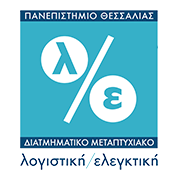Research Methodology II
- GENERAL
| SCHOOL | SCHOOL OF ECONOMICS AND BUSINESS | ||||
| DEPARTMENT | DEPARTMENT OF ECONOMICS AND DEPARTMENT OF ACCOUNTING AND FINANCE | ||||
| LEVEL OF STUDIES | POSTGRADUATE LEVEL | ||||
| COURSE CODE | ΠΜΣ0208 | SEMESTER OF STUDY | 2 | ||
| COURSE TITLE | RESEARCH METHODOLOGY ΙΙ | ||||
| INDEPENDENT TEACHING ACTIVITIES | WEEKLY TEACHING HOURS | CREDIT POINTS (ECTS) | |||
| LECTURES | 3 | 6 | |||
| TYPE OF COURSE | COMPULSORY | ||||
| PREREQUISITE COURSES: | NONE | ||||
| LANGUAGE OF TEACHING AND EXAMINATION: | GREEK | ||||
| THE COURSE IS OFFERED TO ERASMUS STUDENTS | NO | ||||
| ELECTRONIC COURSE PAGE
(URL) |
https://eclass.uth.gr/ | ||||
- LEARNING OUTCOMES
| Learning Outcomes |
| Upon completion of the course, students will be able to:
· Distinguish between basic statistical concepts such as population and sample, quantitative and qualitative variables, census and sample survey, representativeness and precision, sampling and non-sampling errors.
· Draw the population units to be included in the sample when stratified sampling is applied.
· Construct frequency distributions and compute/interpret statistical parameters of central tendency, location, and dispersion.
· Use the properties of the Normal and Student-t distributions to construct confidence intervals and perform statistical hypothesis tests.
· To apply and analyse properties of ARIMA models, as well as to estimate, analyse and evaluate these models on the basis of their predictive ability.
· Apply ARCH and GARCH models to financial data exhibiting volatility clustering and dynamic skewness.
· Apply cointegration techniques for modeling short and long term relationships between economic data.
· Apply techniques for vector autoregressive models (VAR), causality tests, and traditional models using panel data.
|
| General Competencies |
|
· Search, analysis and synthesis of data and information, using the necessary technologies
· Decision-making.
· Autonomous work.
· Teamwork.
· Working in an international environment.
· Working in an interdisciplinary environment.
· Producing new research ideas.
· Respect the natural environment.
· Demonstrate social, professional and ethical responsibility.
· Promoting free, creative and inductive thinking.
|
- COURSE CONTENT
|
The general objective of the course is for students to understand the usefulness of applying statistical-inductive and econometric methods and models. Specific objectives are: (a) To introduce students to fundamental concepts of descriptive and inferential statistics, (b) To familiarize them with the principles underlying the techniques of stratified sampling, (c) To familiarize them with the principles underlying cointegration for modeling short and long term relationships between economic data, (d) To introduce them to ARCH and GARCH models in a way that makes feasible their application to financial data that exhibit volatility clustering and dynamic skewness; (e) To familiarize them with the application and analysis of traditional and dynamic models using panel data, and (f) to offer them the necessary computational skills through the use of statistical/econometric packages.
More specifically, during the lectures the following topics will be discussed:
DESCRIPTIVE STATISTICS: Quantitative/qualitative variables, samples and populations, statistical parameters of central tendency, location and variability, grouped data and histograms, skewness and kyrtosis, relationships between mean, median and mode.
INDUCTIVE STATISTICS: Properties of the Standard Normal distribution, Standard distribution of the sample mean with unknown population variance, degrees of freedom, the Student-t distribution, confidence interval for the population mean with known and unknown population variance, confidence interval for the population proportion, hypothesis tests for population means and population proportions, p-value and examples of its calculation, one way analysis of variance, ANOVA table, correlation coefficient, estimation of single and multiple regression models, confidence intervals and hypothesis testing for the regression coefficients, residual analysis and adequacy check of the regression model.
SAMPLING TECHNIQUES: Stratified sampling: Reasons for its use, allocation of sample in the strata – proportional allocation – Neyman allocation – optimal allocation,
FINANCIAL ECONOMICS: Modelling variation: the ARCH- GARCH models, Vector Autoregressive models (VAR) and causality tests, Non-stationarity and unit root tests, Integration and error correction models, Identification in Standard and cointegrated systems, Traditional models with panel data, Dynamic heterogeneous panels and non-stationary panels.
|
- TEACHING and LEARING METHODS – EVALUATION
| TEACHING METHODS | Postgraduate students will attend lectures either by face-to-face meetings or by using synchronous distance education methods in Hybrid rooms | ||||||||||||
| USE OF INFORMATION AND COMMUNICATION TECHNOLOGIES | Lectures take place in a hybrid room with a wall-mounted screen on which participants appeared remotely. The connection to the lecture is made through the Microsoft Teams software, which gives the capability to the corresponding teacher through a camera to be registered and portrayed. The on-line lecture is supplemented by a Wacom digital pen, which ensures the interactivity of class with notes that appear directly on the students’ screen. In addition, slides are projected and an asynchronous education platform is used for posting course material and students’ assignments, establishing communication between teachers and students, and allowing search for online journals and resources. | ||||||||||||
| ORGANIZATION OF TEACHING |
|
||||||||||||
| STUDENTS’ ASSESSMENT | Assessment is carried out in the Greek language and includes assignments during the semester and a written exam at the end of semester |
- RECCOMENDED BIBLIOGRAPHY
| – Suggested Bibliography:
– Α. D. Aczel, J. Sounderpandian, (2013). Στατιστική Σκέψη στο κόσμο των Επιχειρήσεων, Επιμέλεια Μ. Ε. Σφακιανάκης, Μετάφραση Π. Ε. Μαραβελάκης, BROKEN HILL PUBLISHERS LTD.
– Γ.Χάλκος, (2011). Στατιστική, 3η Έκδοση, Γ. ΔΑΡΔΑΝΟΣ – Κ. ΔΑΡΔΑΝΟΣ Ο.Ε. – – Κ.Ι. Χαρίσης, Π. Α. Κιόχος, (1997). Θεωρία Δειγματοληψίας και Εφαρμογές, Εκδόσεις INTERBOOKS. – – S.K. Thompson, (2002). Sampling, John Wiley & Sons. – – J. Jarrett, (2002). Μέθοδοι Προβλέψεων για Οικονομικές και Επιχειρηματικές Αποφάσεις, Επιμέλεια-Θεώρηση Α. Κιντής, Μετάφραση Β. Καραγιάννη, GUTENBERG.
– Stock H. James,Watson W. Mark (2017), Εισαγωγή στην Οικονομετρία, επιμ.: Πραγγίδης Ιωάννης-Χρυσόστομος, Εκδότης: Γ. ΔΑΡΔΑΝΟΣ – Κ. ΔΑΡΔΑΝΟΣ κ ΣΙΑ ΕΕ.
– Gujarati, D.N., και Porter, D.C., (2012), Οικονομετρία, Αρχές και Εφαρμογές, Εκδότης: ΕΚΔΟΣΕΙΣ Α. ΤΖΙΟΛΑ & ΥΙΟΙ Α.Ε.
– Dimitrios Asteriou, Stephen Hall (2018), Εφαρμοσμένη Οικονομετρία, Εκδόσεις ΠΡΟΠΟΜΠΟΣ.
– Brooks C., 2002, Introductory Econometrics for Finance, Cambridge University Press.
– Wooldridge, J. M. (2019). Introductory econometrics: A modern approach. Cengage learning.
– Zivot, E. (2017). Introduction to computational finance and financial econometrics. Chapman & Hall Crc.
– Tsay, R. S. (2013). Multivariate time series analysis: with R and financial applications. John Wiley & Sons.
– Tsay, R. S., & Chen, R. (2018). Nonlinear time series analysis (Vol. 891). John Wiley & Sons.
– Croissant, Y., & Millo, G. (2018). Panel data econometrics with R. John Wiley & Sons.
– Baltagi, B. H. (Ed.). (2006). Panel data econometrics: Theoretical contributions and empirical applications. Emerald Group Publishing. |
You may also like
Financial Accounting II
GENERAL SCHOOL SCHOOL OF ECONOMICS AND BUSINESS SECTION DEPARTMENT OF ECONOMICS AND DEPARTMENT OF ACCOUNTING & FINANCE LEVEL OF STUDIES POSTGRADUATE LEVEL COURSE CODE MSC0202 SEMESTER OF STUDY 2 COURSE …
Financial Analysis II
GENERAL SCHOOL SCHOOL OF ECONOMICS AND BUSINESS DEPARTMENT DEPARTMENT OF ECONOMICS AND DEPARTMENT OF ACCOUNTING & FINANCE LEVEL OF STUDIES POSTGRADUATE LEVEL COURSE CODE MSC0201 SEMESTER OF STUDY 2 COURSE …
Management Accounting I
GENERAL SCHOOL SCHOOL OF ECONOMICS AND BUSINESS SECTION DEPARTMENT OF ECONOMICS AND DEPARTMENT OF ACCOUNTING & FINANCE LEVEL OF STUDIES POSTGRADUATE LEVEL COURSE CODE MSC0103 SEMESTER OF STUDY 2 COURSE …

